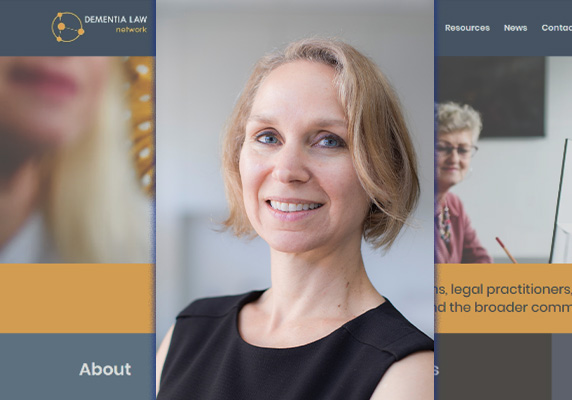Dementia is becoming increasingly prevalent, for younger as well as older people. The legal industry has a long way to go in understanding how to support clients with future planning, and with keeping them out of the criminal justice system when symptoms manifest.
Dementia is the second leading cause of death of all Australians, and the leading cause of death for women. Dr Nola Ries, Director of the Law Health Justice Research Centre and a professor in the law faculty of the University of Technology, Sydney, says it’s surprising there is not more media and industry discussion around the role of the legal industry in working with clients who live with dementia.
Ries, who has legal qualifications from Canada as well as Australia, is an expert in law, health and ageing. With a primary interest in the legal aspects of health system reform, her work centres largely on the intersection of law and dementia. Her focus is on how the legal profession can be supported to recognise its role in meeting the needs of people with dementia (and the needs of their carers, colleagues, friends and family).

According to Dementia Australia, more than 400,000 Australians are living with dementia. The number is projected to increase to more than 800,000 by 2058 unless there is a significant medical breakthrough.
Ries says, “I use Dementia Australia language and definitions, and I’d also refer people to Dementia Australia’s language guidelines for respectful communication about dementia. A point I always make is that numerous conditions fall under the umbrella term of ‘dementia’, but one of the most common forms is Alzheimer’s Disease. There are also other common diagnoses, including vascular dementia.”
‘Not just an older person’s disease’
Ries adds, “I also think there needs to be more awareness that dementia isn’t just an old person’s disease. Younger onset dementia is any dementia diagnosed in those under 65. People are often surprised to hear that a diagnosis can occur when people are in their 40s or 50s.”
Dementia Australia figures show that more than 28,650 Australians aged between 30 and 60 live with younger onset dementia, and this number is expected to rise to more than 42,400 by 2058.
Beyond those directly experiencing dementia, an enormous number of people are engaged in caring roles. More than 1.5 million people in Australia are carers, representing a broader social and cultural concern around whether there is adequate financial, psychological and community support for individuals and families who are juggling caring roles and also working, paying mortgages and experiencing cost-of-living pressures.
At the intersection of dementia and law
In January, Ries launched the Dementia Law Network with co-founder Fiona Kumfor, Associate Professor with the School of Psychology and Brain & Mind Centre at the University of Sydney.
The goal of the Network is to bring together researchers, clinicians, legal practitioners, people living with dementia, their families and the broader community to develop evidence-informed resources and strategies collaboratively, in the interest of improving practices across the medico-legal sphere, and to shape policy. The Network has four pillars of focus: criminal risk behaviours, dementia capability, ethical research participation, and elder abuse.
Ries says, “At the intersection of dementia and law, it’s apparent that cross-disciplinary and cross-sector collaboration is required. That siloed perspective of looking at it purely from a legal angle, health angle, community aged care providers’ angle, doesn’t allow us to understand and implement new practices and policies to ensure people with dementia and carers have better experiences and outcomes.
“[The network has] a key emphasis on doing research on underexamined issues at the intersection of dementia and law. Through that, we want to have a practical impact on everything from the way that an individual lawyer works with their client, through to practices within court systems or legal institutions, and all the way to looking at opportunities to look at reforms to laws and policies.”
Issues for younger people with dementia
Those with younger onset dementia, Ries advises, have issues to contend with in terms of their working lives, dependent family members, and their future planning around healthcare and finances.
“There are a range of legal issues relevant to those diagnosed at a younger age, as opposed to someone who is older and retired who has been diagnosed with Alzheimer’s Disease, where the main symptom is memory loss. These issues can be around employment matters, family law issues, arrangement for care of dependents, and access to the NDIS.
“One of the factors that commonly leads to a diagnosis is out-of-character behaviours, which in some cases can lead to interactions with frontline workers such as security guards, police or ambulance workers.
“Some signs and symptoms of dementia relate to behaviour and personality changes, [and] those behaviours are misinterpreted as criminal behaviour,” says Ries.
Some signs and symptoms of dementia relate to behaviour and personality changes … those behaviours are misinterpreted as criminal behaviour.
“Some research is being led by one of my colleagues at Sydney University, Fiona Kumfor, the co-founder of the Dementia Law Network,” Ries says.
“Kumfor does peer assessments of those who have been referred on suspicion of dementia. Experts in neuropsychology or psychiatry sometimes receive referrals where someone has been arrested but the behaviour is new and unusual, and the family say it’s out of character. Those kind of behaviours might be things like physical and verbal aggression, social or sexually inappropriate behaviour, or it could be risky driving behaviour or shoplifting. Those acts, where they’re out of character, could trigger concern there’s an illness going on.”
Ries says that where police or lawyers are called upon to recognise potential dementia they have to rely on identification by family or friends that the behaviour is new and unprecedented. This means that, for those who don’t have advocates, the system of referring for assessment is not necessarily fair, she says.
Criminal risk behaviours and the dementia diagnosis
In November last year, Ries says: “Kumfor presented a talk at the International Society for Frontotemporal Dementias Conference in France on how behavioural changes in frontotemporal dementia, such as loss of empathy, apathy, disinhibition, social cognition and executive dysfunction, may lead to inappropriate interactions with the criminal justice system. Criminal risk behaviours, especially when they are unprecedented, may be a potential indicator of frontotemporal dementia, which is why it’s vital to educate police and frontline responders, including professionals in the legal system, on how to assess for dementia given the possible implications for sentencing.”
Ries reflects, “The recommendation, based on international studies, is that first time or new offending behaviour in those aged from 50 should trigger a referral for neurocognitive assessment. That training has to be made available to front line responders, including police and ambulance attendants, and it also requires capacity within the health systems for professionals with the right kind of skills and training to do those assessments.”
The recommendation, based on international studies, is that first time or new offending behaviour in those aged from 50 should trigger a referral for neurocognitive assessment.
Appropriate legal support
Ries says one of the priority issues at the Dementia Law Network is ensuring that people diagnosed with dementia have appropriate referrals to legal assistance.
“National clinical practice guidelines for dementia say that when a health professional diagnoses dementia, that person should be informed of how they can access legal services. People may want to take steps to make enduring power of attorney documents, plan for healthcare, seek access to the NDIS or get employment issues advice. There’s still a lack of timely access to that legal help, so that people are not necessarily getting good advice early on in those planning activities.”
Ries is currently leading a project on dementia capability for the legal profession, to ensure that legal documents are being made that will help protect people’s interests in the future.
She advises that solicitors who update wills, or assist clients to appoint an enduring financial power of attorney, name a healthcare decision maker or do healthcare planning, need to have a good understanding of dementia – and good strategies for working with clients where cognitive impairment is an issue.
It’s imperative that lawyers comprehend the enormity of what their work will mean for their client, she says: “If you make good legal documents: estate planning, financial and health planning documents, in theory that should protect [people’s] interests as dementia progresses, but in practice those instruments can be exploited and misused.”
The lack of specialty study into dementia and cognitive impairment, Ries says, is not adequately preparing law students for the reality of working with an ageing population and one where the incidence of dementia is projected to increase greatly.
The lack of specialty study into dementia and cognitive impairment is not adequately preparing law students for the reality of working with an ageing population and one where the incidence of dementia is projected to increase greatly.
“In contract law,” Ries says, “every law student learns that a person needs the capacity to enter a contract, but that’s very basic kind of training. If a student takes a subject in wills and estates then they’d learn something about testamentary capacity to make a will, and disputes over whether a person was unduly pressured to change their will. Some law faculties, including UTS, have elder law subjects, which are electives where students learn about that intersection of law, ageing and capacity in particular. “
A reliable resource for legal professionals and those with dementia or their carers who are seeking specific information on planning and documents is Dementia Australia’s practical guide, “Dementia and Your Legal Rights”, Ries says.
Ries is working on online training courses for lawyers to enhance their knowledge about dementia and prepare them to work ethically and effectively with clients living with dementia, and authored the publication ‘Identifying and Acting on Elder Abuse: A Toolkit for Legal Practitioners’.
Supported decision making
Conversations between the various sectors through the Dementia Law Network have focused on criminal law, civil law, and human rights issues around dementia-inclusive communities. Ries is also keen to use this forum to raise new concerns that hadn’t been priorities until recently.
One of those concerns is for people who don’t have trusted advocates and support networks when they are making legal documents that will dictate their futures.
“There are people who may not have trusted family or friends to name as their legal representatives. For those people there are often difficulties in lack of access to support. There’s been a big shift toward supported decision making rather than the typical legal model of substitute decision making. The ideal situation is that people living with neurocognitive illness make their own decisions for as long as possible. Without appropriate supports, people may end up within public guardianship systems or have a public trustee manage their finances. Recent media investigations have reported on situations that are not positive, but this is anecdotal owing to a lack of research.”
Imminent national plan
Ries says the National Dementia Action Plan, created by the Department of Health and Aged Care in a joint initiative between the federal and state and territory governments, is a promising initiative.
“It’s currently in draft; the aim is to have a plan that will span from 2023 to 2033 in Australia,” she says. Public consultations have closed, and, in alignment with the results of the Royal Commission into Aged Care, the plan will be implemented later this year.




